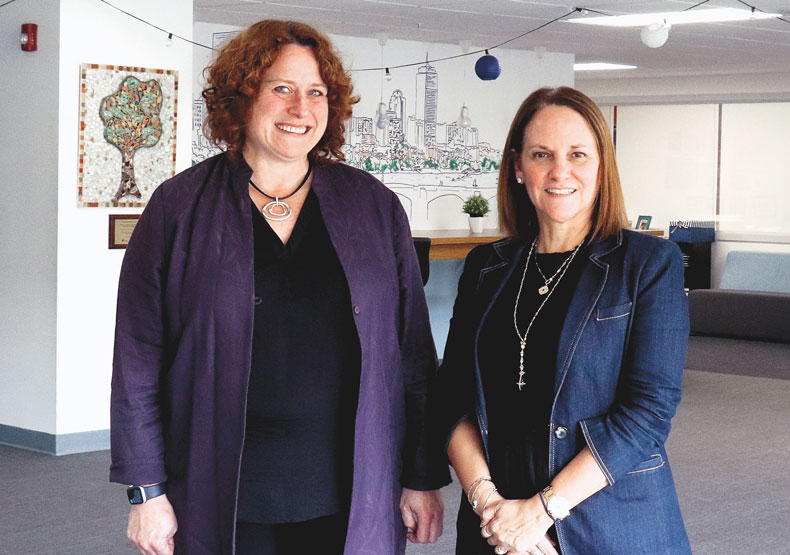College Mental Health Initiative Launched at William James College

Dr. Mēgan Kersting and Sharon Shapiro
The ongoing mental health crisis among college students and young adults remains top-of-mind for college and university administrators across the country. Grant funding from the Boston-based Ruderman Family Foundation (RFF) and the Massachusetts Department of Higher Education has positioned William James College (WJC) to bring valuable resources to campus, establish the College Mental Health Initiative (CMHI), and hire a director, WJC alum Mēgan Kersting, PsyD, to steward this essential work.
“The goal is to create a stronger community of support for college students, extending beyond the counseling center. This program aims to offer initiatives and trainings to enhance the knowledge, skills, and emotional intelligence of university faculty and staff, reducing the reliance on the counseling center for the mental health support of students,” said Director of Young Adult and College Behavioral Health Initiatives, Dr. Kersting, in a nod to the current, albeit unsustainable, model.
WJC’s collaboration with the Ruderman Family Foundation, an internationally recognized organization that works to end the stigma associated with mental health and aims to increase awareness of—and the availability of—mental health services on college campuses, will create opportunities to engage a community of faculty and student-facing staff across New England geared towards promoting safe, positive, and equitable campus cultures. “We have seen first-hand the personal struggles of young adults plagued with mental health-related challenges, and we feel a responsibility to bring awareness and resources to these issues,” said Community Liaison and Trustee Sharon Shapiro, underscoring the RFF’s goal of facilitating changes within communities of young adults to provide healthier and, by extension, better futures for individuals struggling with their mental health.
“Research has shown that school environments can facilitate psycho-social development and—in a time where the rate of children and young adults living with a diagnosable mental health disorder has more than doubled, from 18% to 37%—it is critically important that learning communities assume a role that facilitates this development,” said President Nicholas A. Covino, PsyD. He emphasized that college faculty and staff, even with minimal training, can play a vital role as powerful advocates in aiding students to foster a sense of connection and belonging while assisting them in managing their emotions.
“Student emotional health and well-being is everybody's responsibility,” said Nadja Lopez, PhD, Executive Director of the Center for Behavioral Health, Equity, and Leadership in Schools, who was tapped by Middlesex Community College for help addressing mental health challenges on their campus. A series of six training sessions ensued—with a focus on specific strategies faculty could employ to support the mental health and well-being of students on a daily basis—and laid the groundwork for the CMHI at William James.
Since being introduced in March 2022 at the Presidents’ Convening on College Student Mental Health and Wellbeing at Georgetown University, President Covino and the RFF have been collaborating to address campus mental health. With AICU Mass (Association of Independent Colleges and Universities in Massachusetts), they have sponsored a series of summits, “Reimagining Behavioral Health in Higher Education,” where higher education leaders and campus counseling center directors have come together to tackle critical issues in college mental health, explore innovative solutions, and chart a path forward. The third summit in the series took place this November with the theme of “Celebrating Diversity.”
“Students can’t study if they are depressed or anxious, and they certainly can’t master content,” said Covino, who believes young people’s growth and development, and the future of our country, demands this work be done now. “Our hope with this College Mental Health Initiative is to bring resources to campus that have not existed prior and to invite professors to rethink their pedagogy as a means of increasing belonging, connection and mastery in the classroom.”
- Tags:
- Around Campus
Topics/Tags
Follow William James College
Media Contact
- Katie O'Hare
- Senior Director of Marketing
- katie_ohare@williamjames.edu
- 617-564-9389
